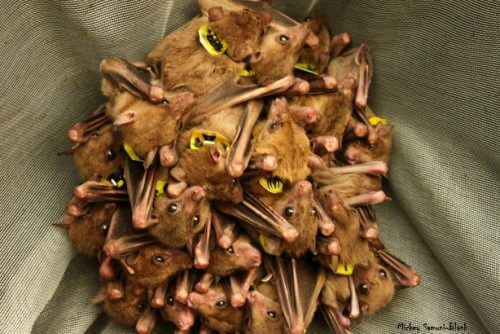A total of four different social situations were identified, characterized by specific readings * The study was published this week (22.12.16) in the journal Scientific Reports from the Nature group



Researchers from Tel Aviv University were able to decipher sounds from the 'bat language', and identify who is delivering the message to whom, and in what situations. "Bats are very sociable mammals that live in colonies of thousands or even millions of individuals," says the head of the research group, Prof. Yossi Yuval from the Department of Zoology in the Faculty of Life Sciences and the Sagol School of Neuroscience at Tel Aviv University. "In fact, the largest cities on Earth are bat cities, and their inhabitants must communicate with each other. We asked to examine what exactly they say to each other."
The intriguing research was carried out in collaboration with research students Mor Taub and Yosef Perat, and it will be published tonight (22.12.16) in the journal Scientific Reports from the Nature group.
"When you enter a cave where a colony of bats resides, you hear a cacophony of voices and chirps," says Prof. Yuval. "Because the density in the colony is high, most of the interactions between its members are in the style of: 'Move! do not bother me!' But is that all? In our research, we tested whether it is possible to extract more information from the bats' sounds."
For the purpose of the study, the researchers recorded the voices of about 20 bats of the Egyptian fruit bat type, living in their own tribe - in the laboratory of the Department of Zoology. The recordings were made continuously, 24 hours a day, over a period of about two and a half months, and were also accompanied by video footage of what was happening in the colony. In total, hundreds of thousands of communication events between the bats were recorded, and the study eventually focused on about 15,000 events, which could be assigned to a specific context.
"In the decoding process, we used algorithms that are currently used for voice recognition in phone applications," says Prof. Yuval. "We checked on the computer characteristics of the sound spectrum of the various bats, through sound wave analysis, and discovered that a lot of information can be extracted from the calls of the bats."
The researchers achieved great accuracy in deciphering various aspects of the 'conversations' between the bats: in 90% of the cases they correctly identified the 'desert' bat, and in 65% also the one to whom the message was directed; In about 80% of the incidents, they also managed to decipher the content, or the context in which the things were 'said'. The context, identified based on the voice alone, was then verified with the video footage of the incident.
In total, four different social situations were identified, characterized by specific calls: a fight over food, for example when one bat tries to steal food from another; Mating attempt - when a male 'tries his luck' with a female, and she taunts and chases him away; An argument during sleep - a tweet that apparently means 'you woke me up!'; and general quarrels between two bats hanging side by side from the roof of the cave.
"Since bats live in the dark, it is only natural that sophisticated vocal communication developed between them," concludes Prof. Yuval. "If we were able to extract information from the sounds with an accuracy level of about 80%, it can be assumed that another bat in the vicinity, with a brain that has undergone an appropriate evolution, understands 100% of what is being said. This is probably an important way of passing social information between the members of the colony, a kind of 'gossip' if you will, as in any community with a developed social life. Is it possible to learn and extrapolate from their language also on the development of our language, humans? For this, further research is needed, but it is quite possible that the answer is positive."

8 תגובות
But the most annoying thing is the reluctance to help on the part of the scientists who receive exposure here. They come to the decision makers, they give them the sign of a screw with their finger, and they disappear, not even giving me an answer back in most cases.
The answers I get are fluff, without logical reasons. And when they try to give it a professional touch, it makes them laugh, like for example I don't have enough logins like the university websites. On the face of it, it seems like a professional argument, but what kind of comparison is this? Do I have courses on the site? A subsite of lecturers, doctoral students, and other people who live on the university's website? Compared to the professional news sites, the knowledge site is in a high place, but that's how it is from Migdal Hasan. From the top of the ivory tower, an elephant looks like an ant.
And the most upsetting thing is that they got together and decided on a joint boycott about two years ago (after all the years it had been in practice) and all the marketing VPs of the universities behave like a cartel and protect their members like a workers' committee - no one dares to give a penny, lest they steal from the others.
The advertising industry is dying because the money went to Google and Facebook and the users went to ad blockers.
As for an external subsidy - it is requested, but the heartless decision makers think that it is not important even if a moment before they got on one stage or another and spoke in praise of encouraging math and science studies.
By the way, in the past there were really more interesting articles in the field of astrophysics, and therefore there was also more participation from the readers. In some cases I learned more from the reactions of scientists here than from the article. Since the site got a redesign a lot of it is gone.
Avi Lebowski goes to great lengths to keep this site up and running against the tide. Advertising on the website can help a lot as well as some external subsidy
Interesting article!
Now you have to move on to the language of dogs and cats with a translator attached to the collar.
Regarding funding, I think it is appropriate that universities wishing to promote certain articles should pay a retainer to the scholar. As well as a subsidy from the Ministry of Education to study quality content based on facts
my father
I have been commenting here for about 7 years. To this day I hear this claim from you.
What reason do they give you for refusing to subsidize?
What is the answer you get from them?
Did you contact the Ministry of Education? Maybe other factors - have you tried?
What do they answer you? Today the website looks less amateurish than before. (Although this site still looks quite anemic).
From your mouth to the ear of... the atoms that sit in the ivory tower.
All the universities in all the twenty years of the site refuse to give a single penny to the site of knowledge under instructions from above. The BDS can learn from them how to hold a boycott and maintain it.
It sounds too much like a sponsored article.
Is there an honest and courageous response to this claim?